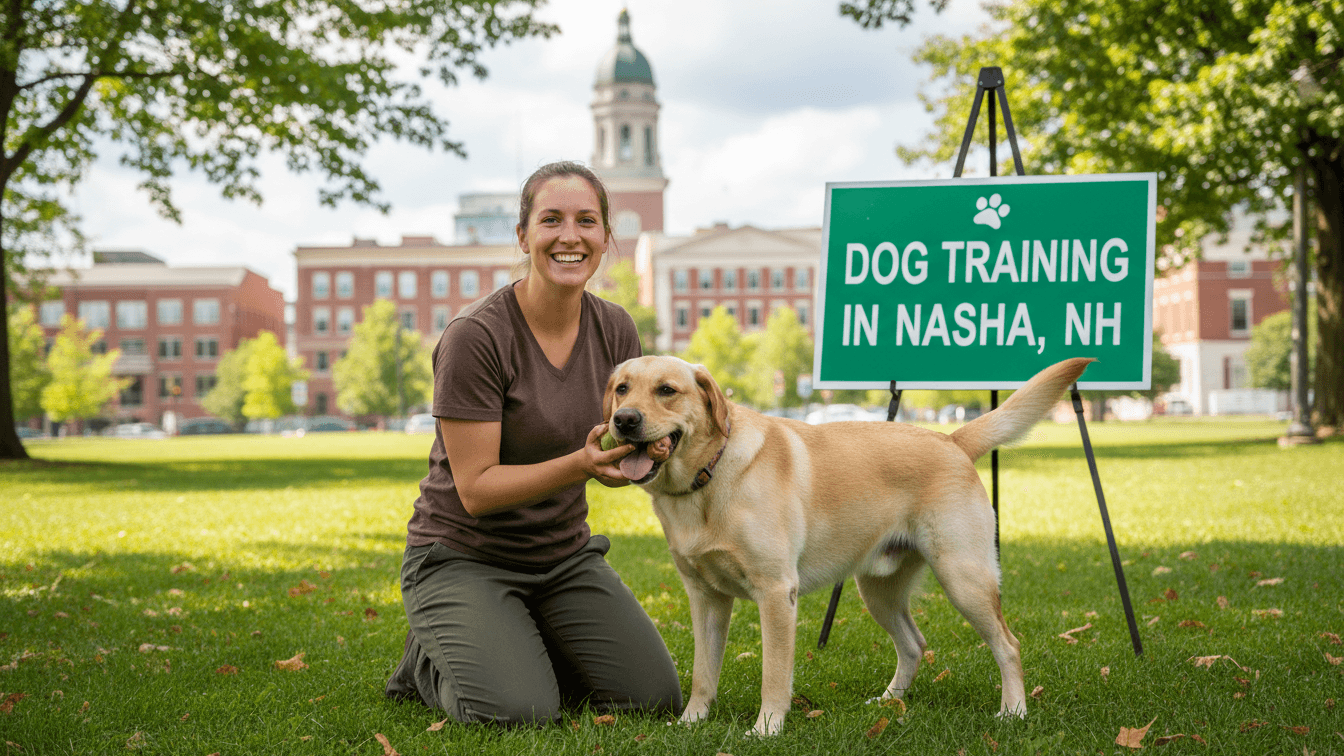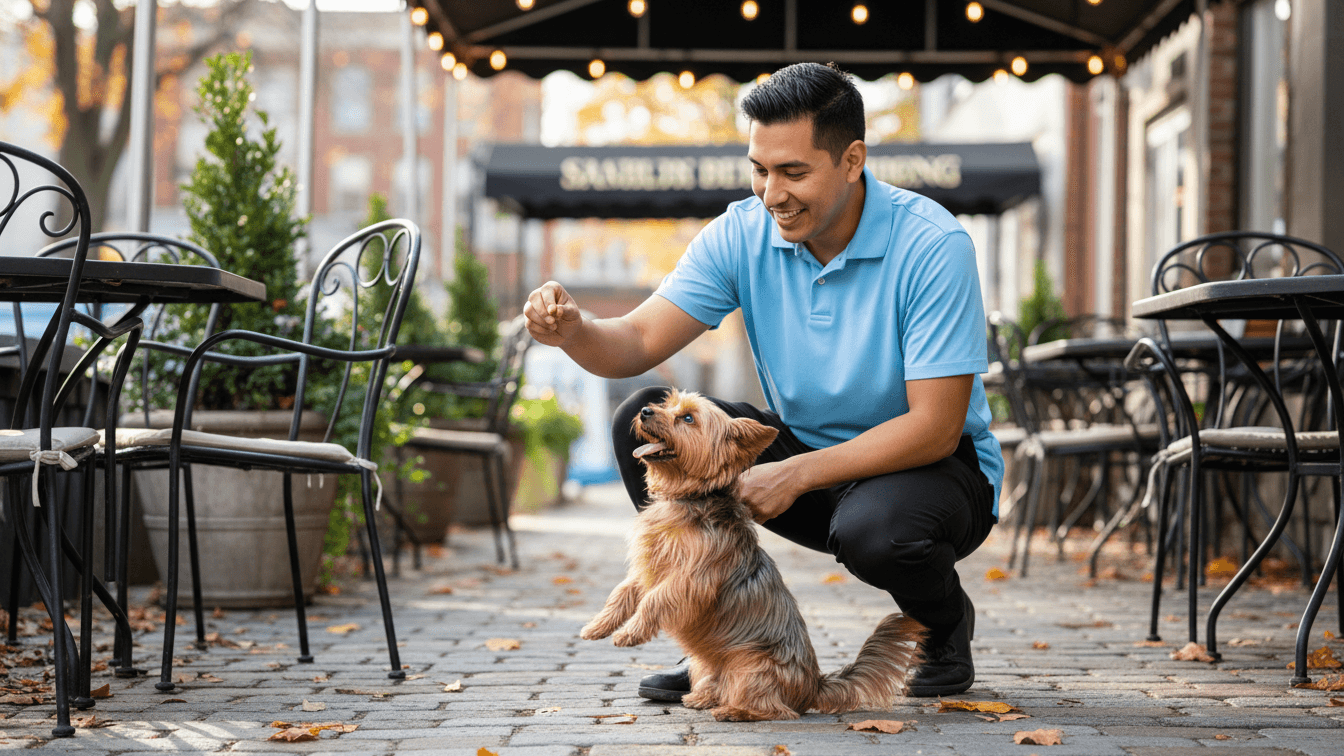Your Complete Guide to Choosing a Dog Trainer in Nashua, NH and Surrounding Areas
Living with a dog in Nashua means you’ll need to prepare for walks through busy downtown streets, visits to local dog parks along the Nashua River, and navigating the New Hampshire winters when sidewalks can be icy. Your dog needs to handle everything from staying calm during crowded Main Street festivals to keeping composed when encountering other dogs on the Heritage Rail Trail.
Since Nashua sits in Hillsborough County, you’ll follow both city ordinances and state regulations. Finding a professional dog trainer who understands these local details makes a real difference when you’re working on practical skills your dog will use every single day in the Gate City.
How to Choose the Right Trainer
Start by looking for someone who uses positive reinforcement training and understands the unique needs of Nashua dog owners. This means your dog should learn to walk calmly through downtown Nashua, stay focused near busy areas like the Pheasant Lane Mall, and handle the distractions that come with living in New Hampshire’s second-largest city.
Credentials give you a reliable way to compare trainers and understand their expertise. Common dog trainer certifications include KPA-CTP, CPDT-KA, or IAABC-CDBC for behavior problems. If your dog shows serious aggression or reactivity, look for someone with CBCC-KA credentials or a science-based program like CTC.
In-home dog training works especially well for puppy training, door manners, and building confidence around household routines. Group classes make more sense once your dog can focus around distractions, particularly before you try busier spots like Mine Falls Park on weekends.
Common Dog Training Methods Explained

Reward-based methods build the trust and cooperation you need while creating behavior changes that last. They also help you follow Nashua’s requirements about keeping dogs under control in public spaces.
Basic obedience covers sit, down, stay, place, recall, and leash training so your dog can handle walks through the downtown area, visits to pet-friendly shops, and park outings without pulling or jumping on strangers.
Puppy classes focus on early socialization, potty training, bite inhibition, crate comfort, and foundation skills. Starting with short, positive training sessions prevents problem behaviors from taking root during those critical early months.
Behavior modification addresses fear, reactivity, resource guarding, or separation anxiety through careful desensitization and counterconditioning. For serious cases, ask if your trainer collaborates with local veterinarians or veterinary behaviorists.
Private lessons let you customize everything around your daily routines and your dog’s specific needs. Day training can accelerate results when your schedule doesn’t allow for regular training sessions during the week.
Dog training classes help your dog practice good manners around other dogs and people in a controlled setting. The best classes give dogs adequate space, screen participants carefully, and teach calm behavior instead of just excitement.
Specialized training like therapy dog training or service dog training requires extra structure, public-access skills, and a carefully planned training program with measurable milestones.
Stay away from trainers who rely on fear, intimidation, or pain to get results. Humane methods are safer for everyone, easier to maintain long-term, and far better for building a well-behaved dog you can trust around neighbors and visitors.
Average Cost of Dog Training in Nashua, NH (Updated for 2025)
Prices around Nashua and Hillsborough County vary based on the trainer’s experience, session length, and whether they travel to your home. Here’s what most Nashua pet owners are paying for dog training services in 2025.
| Service Type | Average Cost (Nashua/Hillsborough County) |
|---|---|
| Puppy classes (4-6 weeks) | $160-$285 total |
| Group obedience training (4-6 weeks) | $170-$310 total |
| Private lessons (60-90 min) | $115-$200 per session |
| In-home coaching packages (4-6 visits) | $450-$950 total |
| Day training (trainer works your dog) | $475-$1,000 per week |
| Behavior consult for aggression/anxiety | $165-$275 |
| Board and train (2-4 weeks) | $2,200-$4,800 total |
You might pay additional travel fees for locations further from central Nashua, and expect higher rates for complex behavior work or aggressive dog training.
Make sure you understand what’s included in the package, how the trainer measures progress, and whether they offer a free consultation or free evaluation before you commit.
Questions to Ask a Potential Dog Trainer
- What training methods do you use, and how do you keep training sessions positive and stress-free?
- What credentials do you hold, like CPDT-KSA or KPA-CTP? Do you keep up with continuing education?
- How will you customize the training program for my dog’s specific needs and our Nashua lifestyle?
- Do you offer in-home visits, group classes, or day training, and which approach fits my goals best?
- How will we track my dog’s progress and know when to add more distractions or difficulty?
- What are the total costs, including any travel fees within Hillsborough County, and what’s your cancellation policy?
- Do you carry liability insurance, and can you provide proof of coverage?
- For behavior problems, will you coordinate with my veterinarian if needed?
- What should I practice between sessions to help my dog keep improving?
Local Nashua Rules and Considerations
Nashua enforces leash laws and nuisance ordinances to keep parks and neighborhoods safe for residents and their pets. New Hampshire also has statewide requirements that apply throughout Hillsborough County.
Dogs must be leashed and under control in all public areas unless inside a designated off-leash dog park. Keep a standard 6-foot leash with you for downtown walks, the Heritage Rail Trail, and community events.
New Hampshire requires current rabies vaccination for all dogs over three months old. You’ll need to keep the rabies certificate on file and the tag on your dog’s collar at all times.
Excessive barking can be considered a nuisance under Nashua ordinances, so work with your trainer on alert barking and separation anxiety before neighbors file complaints. If your certified dog trainer wants to use city parks for commercial sessions, they may need permits and proof of liability insurance.
New Hampshire doesn’t require special licenses for expert dog trainers, but if a business boards dogs for payment as part of a board and train program, they must follow state regulations regarding kennel licensing and animal welfare standards.
The City of Nashua posts information about local ordinances and pet regulations on their official website. Hillsborough County also provides resources through local animal control for licensing questions and lost pet services.
Local Nashua Resources for Dog Owners
These spots give you excellent places to practice obedience training, work on socialization, and provide safe enrichment for your dog. Always follow posted rules and be respectful of other park users.
- Greeley Park Dog Park on Concord Street offers fenced areas where dogs can practice recalls and greetings off-leash under supervision.
- Mine Falls Park provides miles of trails along the Nashua River where leashed dogs can work on focus and calm walking around joggers, cyclists, and wildlife.
- Roby Park Dog Park on Amherst Street gives you another fenced option for practicing off-leash skills in a safe, controlled environment.
The Heritage Rail Trail welcomes leashed dogs and provides great opportunities to practice loose-leash walking and impulse control around other trail users. Downtown Nashua’s Main Street district is increasingly dog-friendly, making it a useful spot to practice polite greetings and calm behavior around pedestrians and outdoor diners.

FAQs
How much does in-home dog training cost?
Most Nashua trainers charge $115-$200 per in-home visit, with package discounts available when you buy multiple sessions. Behavior problems like reactivity or aggression typically start at the higher end of that range.
Is in-home dog training worth it?
Absolutely, because you’re addressing problems exactly where they happen. Your trainer can help with door manners, jumping on guests, counter-surfing, and yard reactivity right at home, then step outside to practice leash skills on your actual neighborhood sidewalks and help your dog become better behaved in real-world situations.
Can you pay someone to house train your dog?
Yes, many trainers offer puppy programs that include potty training, crate routines, and establishing daily schedules. Day training can speed up the process significantly while teaching you how to maintain the progress once your dog comes home.
What is the 3-3-3 rule for dog training?
This is a helpful guideline for new or adopted dogs: expect about 3 days for your dog to decompress, 3 weeks to learn your routines, and 3 months to feel completely settled. Good training for dogs works with this natural adjustment period rather than against it.
How long will it take to reach my training goals?
Most puppies and friendly adult dogs show solid progress within 4-8 weeks if you practice daily between training sessions. Fear, reactivity, or aggression typically requires several months of careful behavior modification with gradual increases in difficulty and distraction levels.
What should I bring to group classes?
Pack a flat collar or harness, a 6-foot leash, high-value treats, water, waste bags, and current vaccination records if your trainer requests them. Leave retractable leashes at home because they can be unsafe around other dogs.
What’s the leash law in Nashua?
Dogs must be leashed and under control in all public areas throughout Nashua, except inside designated off-leash dog parks. Keep that 6-foot leash handy for downtown walks, neighborhood streets, and the Heritage Rail Trail.
Do I need a dog license in Nashua or Hillsborough County?
New Hampshire requires all dogs to be licensed annually through your local municipality. You can obtain a dog license through the Nashua City Clerk's office by providing proof of current rabies vaccination. Fees are typically lower for spayed or neutered dogs.
What shots does my dog need in Hillsborough County or New Hampshire?
Rabies vaccination is required by state law for all dogs over three months old in New Hampshire. Your veterinarian may also recommend distemper-parvo combination vaccines and bordetella based on your dog’s lifestyle and exposure to other dogs.
Are dog trainers required to be licensed in Nashua or Hillsborough County or New Hampshire?
No special licenses exist for dog trainers in New Hampshire. Trainers follow normal business regulations, but facilities that offer board and train services may need to comply with state kennel licensing requirements if they house dogs overnight for payment.
Where can I practice off-leash recall?
Use fenced dog parks like Greeley Park Dog Park or Roby Park Dog Park to keep things safe and legal while working on recall and other off-leash skills. Try visiting during quieter times when you’re first starting out with a top dog training plan.
Which dog parks allow training around Nashua?
Greeley Park Dog Park and Roby Park Dog Park both welcome training activities within their fenced areas. These parks provide safe environments to practice recalls, greetings, and impulse control around other dogs under controlled conditions.
What beaches or trails allow dogs for training?
While Nashua doesn’t have ocean beaches, Mine Falls Park offers extensive trails where leashed dogs can practice focus around joggers, cyclists, and wildlife. The Heritage Rail Trail also welcomes leashed dogs and provides a perfect setting for leash training and building calm behavior around distractions. These locations are ideal for practicing real-world skills your dog will need throughout the city.
How do I find a certified dog trainer in Nashua?
Look for trainers with recognized dog trainer certifications and ask about their methods during a free evaluation. Check reviews, ask for references, and make sure their approach aligns with positive reinforcement training rather than punishment-based methods.
What if my dog is reactive to other dogs?
Work with a trainer experienced in behavior modification who can create a systematic desensitization plan. Start by practicing at a distance where your dog can stay calm, then gradually decrease distance as your dog improves. Nashua’s quieter trails and parks during off-peak hours provide good practice environments.
The right combination of thoughtful planning, humane methods, and consistent practice around Nashua’s neighborhoods and parks will help your dog become a confident, well-behaved companion. Whether you’re walking through downtown, exploring Mine Falls Park, or just navigating daily life in the Gate City, expert dog trainers who understand the local area can make all the difference in reaching your goals.
